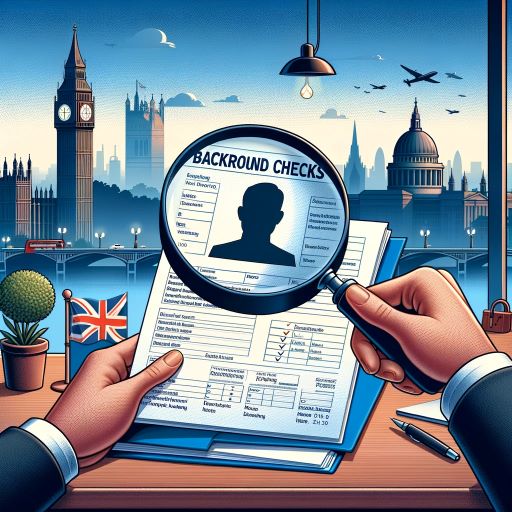

Employment screening encompasses the processes used to assess whether a person is fit for a specific job role. This includes evaluating not just new hires but also those transitioning to different positions within an organization. Screening should be consistently applied to anyone gaining access to company assets, whether they are permanent employees, temporary staff, or contractors.
Implementing proper screening methods offers a costeffective way to ensure compliance with legal standards and guarantees that only qualified individuals are employed in suitable roles within your organization.
The extent and nature of screening can differ widely between organizations and even among different job positions within the same company. Making screening decisions based on comprehensive security risk evaluations ensures that the strategies employed are aligned with the level of risk, optimizing the use of resources effectively.
When considering a background check in the UK, know the various types like right to work, criminal records, and credit checks. Understanding the importance, especially DBS checks for safety, helps make informed choices. Employers rely on checks for hiring decisions and legal compliance. Eligibility criteria for enhanced checks differ across regions. Managing the results, addressing concerns, and clear communication are key. Engage openly with employers and promptly resolve any issues. By grasping implications and engaging proactively, you guarantee a smooth process. If you're looking to safeguard your interests further, knowing more about free options and personal record checks can be valuable.
When considering employment opportunities in the UK, understanding the significance of Criminal Record Checks is crucial. These checks play a vital role in ensuring the safety and security of vulnerable populations and maintaining positions of trust.
In the UK, Criminal Record Checks are commonly referred to as Basic, Standard, and Enhanced DBS checks. Basic checks primarily disclose unspent convictions in England & Wales. They're widely available for any purpose in Northern Ireland and Scotland.
In the UK, the duration of pre-employment screening checks can vary significantly depending on the type and depth of the checks being conducted, as well as the industry and specific job role requirements. Generally, basic checks, such as identity verification and employment history, can be completed within a few days to a week. More comprehensive checks, including criminal record checks (DBS checks), credit history, and higher-level security clearances, may take longer.
An employee background check can encompass a wide range of verifications and screenings to assess a candidate's history and suitability for a position. The specific elements included in a background check may vary depending on the job, the industry, and the employer's requirements. Common components of an employee background check include:
Identity Verification: Confirms the candidate's identity through government-issued documents like passports or driver's licenses.
Employment History Verification: Checks the candidate's previous employment, including positions held, dates of employment, reasons for leaving, and rehire eligibility.
Education Verification: Confirms the candidate's educational degrees, diplomas, and certificates from colleges, universities, and other educational institutions.
Criminal Record Check: Searches for any criminal convictions, cautions, reprimands, or warnings. In some countries, this is known as a Disclosure and Barring Service (DBS) check in the UK or a criminal background check in the US.
Credit History Check: Reviews the candidate's credit history, which can be relevant for positions involving financial responsibilities. This check typically includes looking at credit scores, outstanding debts, bankruptcies, and financial mismanagement.
Reference Checks: Involves contacting previous employers, colleagues, or academic references to gain insights into the candidate's work ethic, abilities, and behavior.
Moving up, Standard checks provide a more comprehensive overview by including both spent and unspent convictions, cautions, reprimands, and warnings from the Police National Computer in England & Wales.
Enhanced checks, on the other hand, involve detailed investigations encompassing various sources such as police force checks and the Disclosure and Barring Service. These checks are vital for positions requiring a higher level of scrutiny and can include information from relevant barred lists in England & Wales, Northern Ireland, and Scotland. Understanding the nuances of each level of check is crucial when exploring employment opportunities in the UK.
Background checks in the UK encompass various types, including right to work checks, criminal record checks, employment references checks, educational references checks, and credit checks. Employers use right to work checks to verify employees' eligibility to work in the UK.

Criminal record checks are essential for roles involving trust or vulnerable populations. Employment references checks help confirm a candidate's work history and performance. Educational references checks validate an individual's academic qualifications. Credit checks may be necessary for positions involving financial responsibilities.
In addition to these standard checks, some employers conduct social media screenings to assess candidate behavior. Certain industries, like finance, may require specific checks such as credit checks or directorship suitability checks.
Background checks are particularly important for senior leadership roles, positions with vulnerable groups, and roles handling sensitive information. Both public and private sector organizations in the UK conduct these checks as part of their hiring due diligence.
To facilitate the process of conducting personal record checks in the UK, you can directly request your own basic criminal record check for employment purposes. This allows you to have control over the information provided to potential employers.
Here is a breakdown of some key points regarding conducting personal record checks in the UK:
Key Points Details Action

Request Process Apply online or by post. Initiate your basic criminal record check request.
Processing Time Usually processed within 14 days. Plan ahead to receive your check in a timely manner.
Cost £18 for a basic criminal record check. Budget for the fee required for the check.
Information Included Unspent convictions in England & Wales. Understand the scope of information in the basic check.
Usage Present to potential employers. Enhance your job application with a clean record check.
Enhanced check eligibility criteria vary by region, with specific requirements set for England & Wales, Northern Ireland, and Scotland. To meet the criteria for an Enhanced Check in these regions, you may need to take into account the following:
